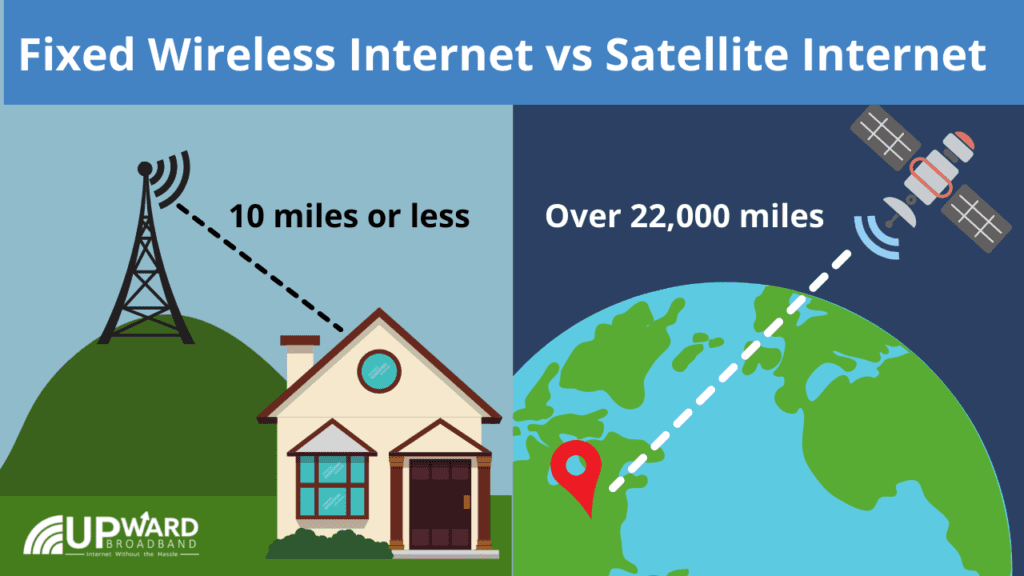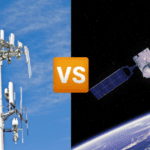Fixed wireless internet and satellite internet offer an alternative to DSL or cable subscriptions. And for many homes and businesses in rural areas, these are welcome options. Because of the cost associated with cable internet infrastructure, many rural communities don’t have access to this high-speed option.
While fixed wireless and satellite are popular in rural (and non-rural) areas, what makes them different, and which one is better?
In this blog, we’ll look at how each type of internet works and where the main differences between the two services lie.
What’s the Difference Between Fixed Wireless Internet and Satellite Internet?
Fixed wireless and satellite subscriptions both provide internet services to their subscribers by transmitting from a distribution point to an access point. The access point is where you access the internet, so it’d be an antenna or dish that’s connected to your home or business.
The main difference is the composition of the distribution point and the distance of the distribution point from the access point.
Satellite internet’s distribution point is a satellite that’s orbiting the Earth about 22,000 miles away. Fixed wireless’s distribution point is more local—typically a cell tower within ten or so miles from your access point.
That distance creates many differences in the type of service you’ll get with satellite internet vs. fixed wireless internet. It impacts everything from latency to consistency of signal to the cost.

What About Latency?
One of the most significant differences you’ll notice between fixed wireless services and satellite internet connection is the latency.
Latency is how long it takes for data to go from the transmission point to the access point. High latency can make your connection feel delayed or laggy, even if you dish out extra for high download speeds.
With satellite, the data has to travel the distance from your home or business to Earth’s orbit, which is a pretty far distance (about 22,000 miles). This leads to relatively high latency compared to other internet services, making your connection feel delayed.
Even with Starlink or low-orbit satellite internet plans, the distance is still hundreds of miles, which is far greater than the ten or so miles of fixed wireless internet. Their latency may be better than traditional satellite, but it won’t be as responsive as fixed wireless.
High latencies can make activities like online gaming, voice calls, and video frustrating. The lag from the latency can make it feel like you’re left waiting for your game or call, disrupting its flow.
Fixed wireless internet, on the other hand, works with a local connection. You’ll receive internet from a cell tower that’s typically within ten miles of your home or business. Because the signal has a shorter distance to travel, the latency is much lower, and your connection will be more responsive and lag less.
Does Weather Impact Satellite or Fixed Wireless Internet?
Whether it’s sunny, cloudy, stormy, or just damp, modern internet users expect to have consistent, reliable internet. However, with satellite, that’s not always the case.
Even mild atmospheric conditions, like high humidity, can negatively impact your internet connection. And because the signal has to travel through the atmosphere, a storm system in the next state over can give you internet trouble.
Fixed wireless internet avoids the need to travel through the atmosphere, meaning weather won’t impact your receiving service. Even severe local weather, like heavy rains or dense fog, does not interfere with your fixed wireless internet connection.
That said, severe winds could potentially cause problems if your antenna system is blown out of place. However, fixed wireless antennae are installed securely with this in mind, so heavy winds shouldn’t be a problem.
Are These Services Available to Everyone?
When it comes down to it, your ideal internet service may not be available in your area. Because the infrastructure related to bringing broadband-speed cable internet to every home and business in America is expensive, companies focus on areas with high population density.
However, satellite and fixed wireless both offer internet options to many underserved areas.
Satellite internet is available essentially anywhere, as it connects to a satellite orbiting Earth. But to access fixed wireless internet, you’ll need to be within the line of sight of a tower that broadcasts these services.
So while fixed wireless internet is an excellent option for many people, it isn’t available everywhere.
To see if Upward Broadband can bring fixed wireless internet to you, check our Service Area Map.
What is the Cost?
Fixed wireless internet is less expensive to set up and operate compared to satellite internet. That means fixed wireless internet providers can pass those savings on to their customers.
In addition to lower monthly bills, some fixed wireless companies (like Upward Broadband) offer you service with no data caps. That means your service won’t be throttled, and you won’t be charged overage fees, regardless of how much you use the internet.
It can be costly for many satellite internet providers if their subscribers are using a great deal of bandwidth each month. Understandably, they’ll need to limit this amount by instituting data caps. If you go over a certain amount, you may have your speeds reduced or face additional charges.
Which Is Better For You – Satellite vs Fixed Wireless Internet?
When comparing fixed wireless vs. satellite internet options, you’ll want to take a look at who has the best combination of price and service.
Fixed wireless internet offers a more local option, which means lower latency, more reliable service, and better prices and terms. That said, it may not be available in your area, whereas satellite internet likely is.





